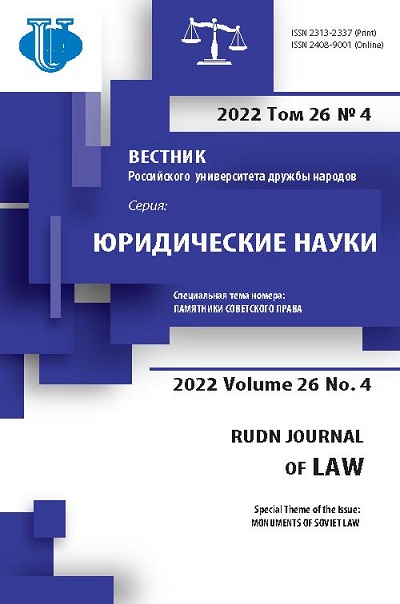Social Significance of the RSFSR Criminal Code of 1922: historical, legal and humanitarian aspects
- Authors: Stepanenko R.F.1,2
-
Affiliations:
- Kazan (Volga region) Federal University
- The University of management «TISBI»
- Issue: Vol 26, No 4 (2022): MONUMENTS OF SOVIET LAW
- Pages: 877-889
- Section: CRIMINAL LAW AND CRIMINOLOGY
- URL: https://journals.rudn.ru/law/article/view/32974
- DOI: https://doi.org/10.22363/2313-2337-2022-26-4-877-889
- ID: 32974
Cite item
Full Text
Abstract
The article examines experience and practices of the formation of the Soviet criminal legislation of the post-revolutionary period of Russia at the beginning of the 20th century and their significance for the development of domestic system of law. Attention is focused on the analysis of the norms of the General Part of the Criminal Code of the RSFSR of 1922, for the first time in the national history of state and law, which meaningfully fix social and humanistic patterns that were not previously characteristic of the criminal law normative sphere. The complexity of generating ideas and foundations of Soviet criminal law in conditions of uncertainty, multiplied by many problems of a political, socio-economic, legal, cultural, and other nature, determined the dominance of the ideological content of the introduced restrictions and penalties. On the other hand, the peculiarities of punishment system formation of the period under review should include the innovative social and humanistic orientation, which later became the basis for democratization and humanization of criminal, penitentiary, and criminal procedural law in Russia.
About the authors
Raviya F. Stepanenko
Kazan (Volga region) Federal University; The University of management «TISBI»
Author for correspondence.
Email: stepanenkorf@yandex.ru
SPIN-code: 6988-5749
Doctor of Legal Sciences, Full Professor of the Department of Theory and History of State and Law 18 Kremlevskaya str., Kazan, Republic of Tatarstan, 420008, Russian Federation; 13 Mushtari str., Kazan, Republic of Tatarstan, 420012, Russian Federation
References
- Alekseev, S.S. (1999) Philosophy of law: history and modernity. Problems. Trends. Perspectives. Moscow, Norma Publ. (in Russian).
- Chuchaev, A.I. (2022) The First Soviet Criminal Code: Conceptual Foundations and General Characteristics (To the 100th Anniversary of the Adoption). State and Law. (6), 152-167. https://doi.org/10.31857/S102694520020481-0 (in Russian).
- Hegel, G.W.F. (1990) Philosophy of law. Trans. from German. Kerimov D.A. & Nersesyants V.S. (eds.). Moscow, Mysl’ Publ. (in Russian).
- Dubinin, N.P., Karpets, I.I. & Kudryavtsev, V.N. (1982) Genetics, behavior, responsibility: (On the nature of antisocial acts and ways to prevent them). Moscow, Politizdat Publ. (in Russian).
- Lenin, V.I. (2020) Marx, Engels, Marxism. Moscow, Algoritm Publ. (in Russian).
- Liventsev, D.V. (2022) The Institute of Alternative Legal Responsibility in the Period of Revolutionary Legality: Historical and Legal Research. Author. of dis. … Cand. of legal sciences. Kazan, The University of management TISBI. (in Russian).
- Mamardashvili, M.K. (1994) Philosophy and personality. Chelovek. (5), 5-19. (in Russian).
- Markova, L.A. (2014) Transformations of interdisciplinarity in the context of social epistemology. Filosofiya nauki. 19 (1), 27-37. (in Russian).
- Marx, K. & Engels, F. (1959) Toward a critique of political economy. In: Collected works, ed. 2nd, T. 13. Moscow, Politizdat Publ. (in Russian).
- Piontkovskii, A.A. (1894) On probation or probation system. Criminal-Political Research. Odessa, Tipo-lit. Headquarters of the Odessa Military District Publ. (in Russian).
- Stepanenko, R.F. (2018) Legal risks as a subject of study in general theory of law: problems and prospects of the methodology of interdisciplinarity. State and Law. (6), 13-22. https://doi.org/https://doi.org/10.7868/S0132076918060021 (in Russian).
- Sundurov, F.R. (2005) Punishment and alternative measures in criminal law. Kazan, Kazan State University. (in Russian).
- Tikhomirov, Yu.A. (2022) State: monograph. Moscow, Norma Publ. INFRA-M Publ. (in Russian).
- Vlasenko, N.A. (2017) Categories «uncertainty» and «certainty» in the study of law and philosophical problems. Legal Science and Practice: Journal of Nizhny Novgorod Academy of the Ministry of Internal Affairs of Russia. 1(37), 8-17. (in Russian).
- Vlasenko, N.A. (2021) The declining state: Aristotle teachings and post-Soviet reality. RUDN Journal of Law. 25(3), 479-505. https://doi.org/10.22363/2313-2337-2021-25-3-479-505 (in Russian).
- Vlasenko, N.A. (2022) The modern Russian state. Essays. Moscow, Norma Publ. (in Russian).
Supplementary files















